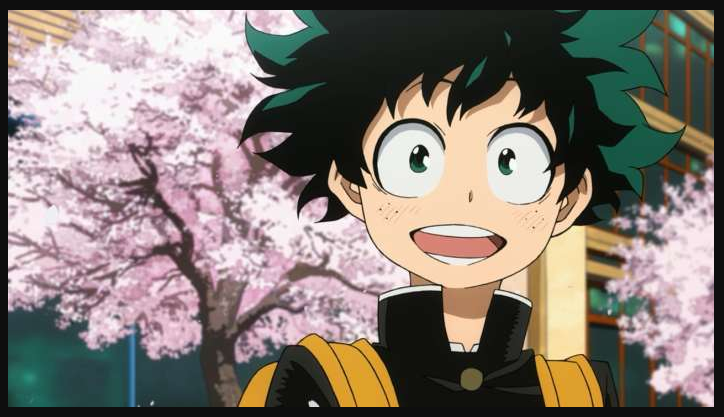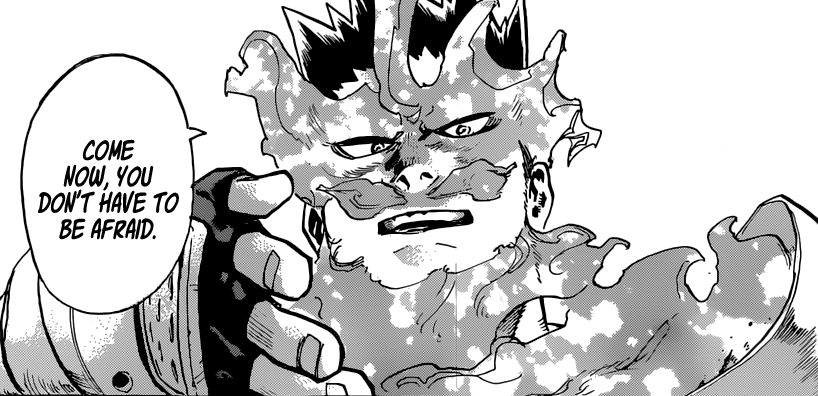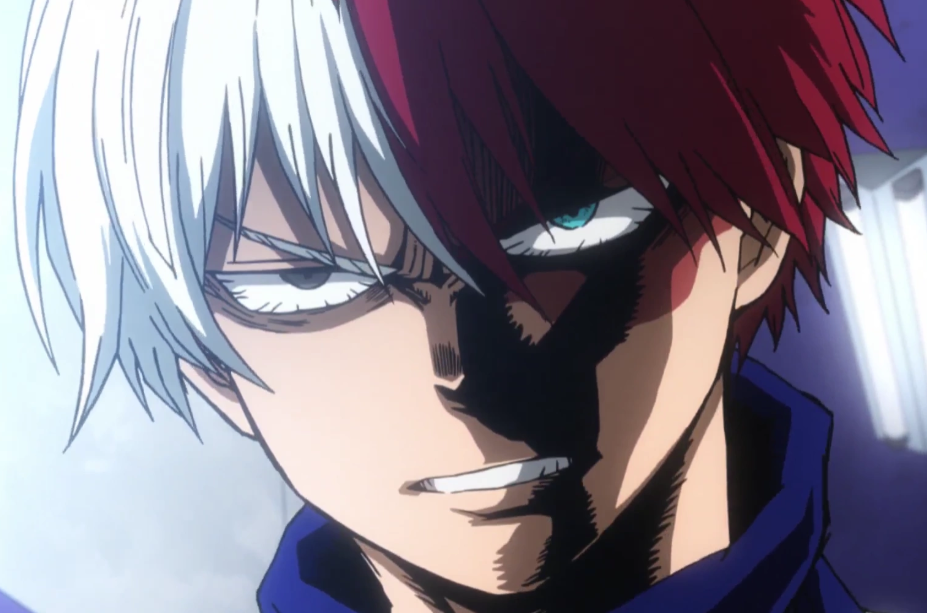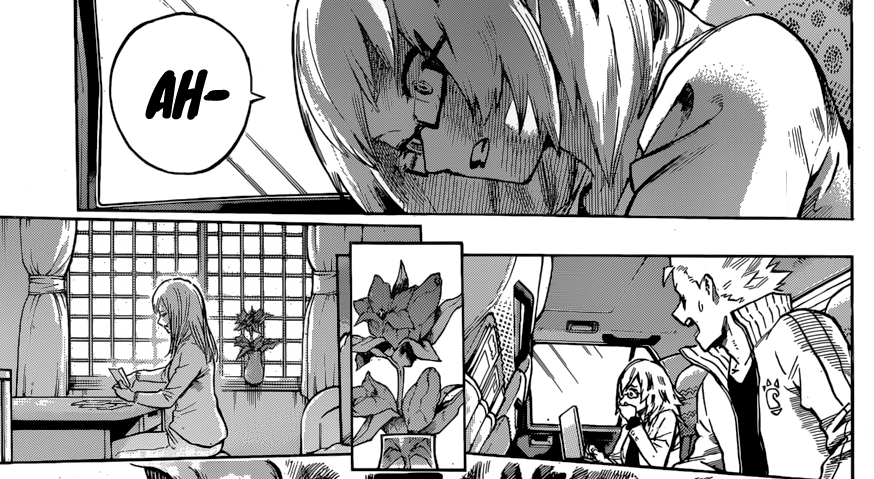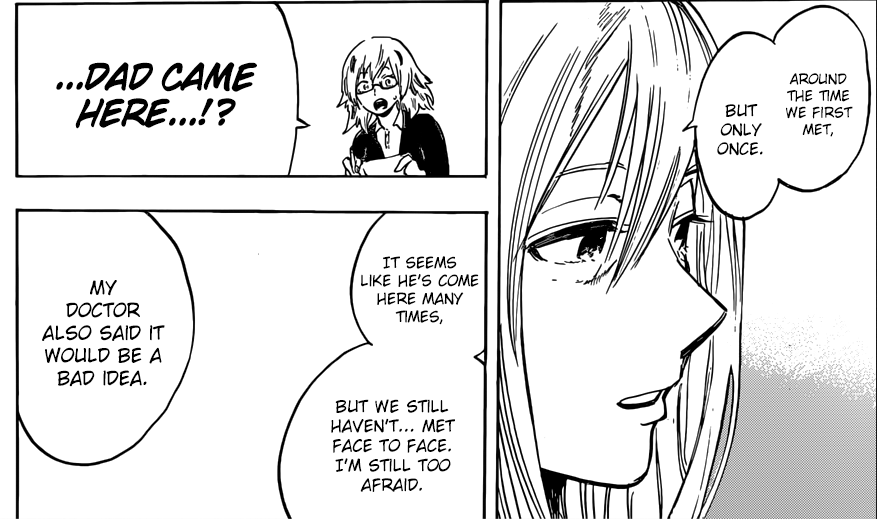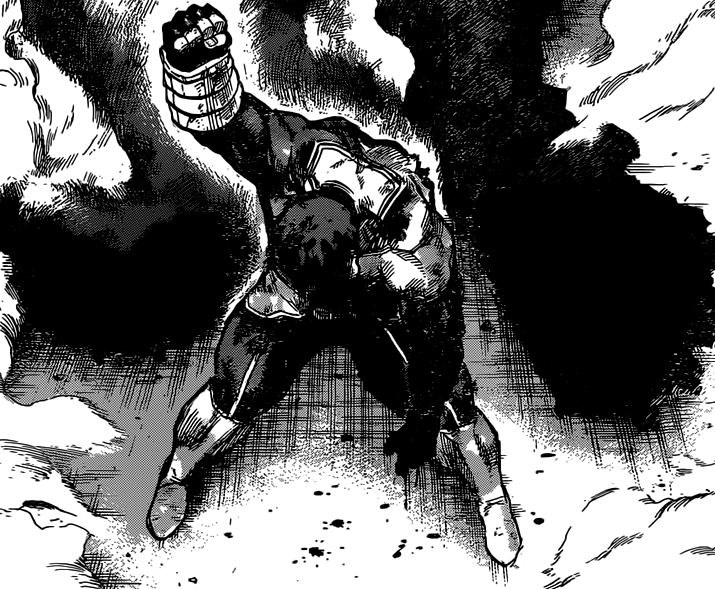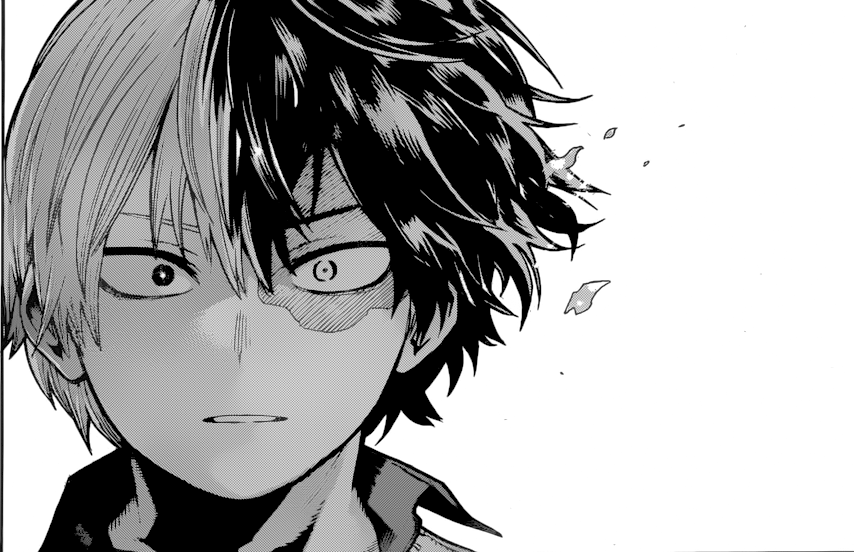Thoughts on... Endeavor, and how to humanise villains (My Hero Academia Spoilers)
I started reading My Hero Academia about two years ago. It was a grower. I had stumbled across it earlier, but the first chapter did little for me, and I quickly discarded it. One day, I returned to it after looking for new manga to read, and I ended up devouring almost 100 chapters in a day. I caught up to the manga just halfway through the Forest Training/School Trip Arc and loved it. For the uninitiated, My Hero Academia by Kohei Horikoshi (or Boku no Hero Academia, but I'll call it HeroAca) is set in world where the majority of the population have "Quirks"--superpowers. Some people decide to be professional heroes, employed by the government, to defeat villains. The protagonist, Izuku Midoriya, is quirkless, a rare trait, but he dreams of growing up to be like All Might, Japan's Number One Hero and Midoriya's personal one. The two meet, leading to All Might giving his Quirk to Midoriya, which makes him the new inheritor of One for All. HeroAca chronicles Midoriya's journey to becoming the Number One Hero and his relationship with his hero mentor.
Horikoshi has the ability to turn most hero character tropes on their heads, whilst still keeping within the shounen genre: underdog protag with innocent weaker female love interest; rival-slash-friend who begrudgingly respects the protag, legendary mentor--we've seen a lot of these things before (Naruto and Bleach come to mind immediately), however these tropes are interrogated by a hero system that is flawed and corrupt, a group of villains that are morally grey and sympathetic, a protag that is no more important than the friends he surrounds himself with, and often requires moral direction from his peers. It makes for a refreshing story, but no story is without fault.
Midoriya. He's sweet.
For the past month, the HeroAca fandom has been in self-destruct mode over the character Endeavor, the former Number Two Hero who has nabbed the top spot in the wake of All Might's retirement. Endeavor is the abusive father of my favourite character, Shoto Todoroki, a prodigy with the Quirk half-cold, half-hot. As the name suggests, Todoroki utilises the power of fire and ice. He's stoic and calm, and in the earlier chapters he constrains his fire powers out of a hatred for Endeavor, from who they came. Endeavor was awful to his family, Todoroki's siblings, and his wife, forcing her to into the role of broodmare to produce a rightful heir to his powers, and because his older siblings only inherited their mother's ice powers, Todoroki became Endeavor's special project, and was isolated from the rest of the family to train for the purpose of one day surpassing All Might. Endeavor's abuse triggered his wife's mental breakdown, which culminated in her throwing scalding water in a younger Todoroki's face through a fear of his "half-hot" side, permanently scarring him.
But I am...
The story is grim, and Endeavor's selfish desire to surpass All Might just on the basis of being strong and forceful is always framed in complexity, with the knowledge that many of the heroes that everyone admires are not very heroic at all. Endeavor constantly fails to match All Might's standard and charisma, and this knowledge kills him. He is angered when All Might engages in his final fight, showing the world that he had been suffering from a serious illness for a long time, and revealing his true form: a weakened skeleton of his usual bulky, impressive presence. All along, Endeavor placed value in All Might's strength, and he spent his pro hero career simply trying to get stronger in order to beat him, only to discover just how massive a valley existed between them. The relationship between the two heroes is portrayed brilliantly, however, the recent chapters have been disappointing for me.
Todoroki, literally raging about Endeavor during the tournament arc
The latest arc has just started, and now that Endeavor is Number One, he's been struggling to appeal to the masses in the same way All Might did. This new arc has introduced a host of up-and-coming heroes that are more popular than the Number One, much to his chagrin. This is obvious to the reader: Endeavor isn't even heroic to his own family, and he's made no attempt to interact with the public. They do not care for him, and neither does the reader. In the shadows of this arc, an attempt for Endeavor to redeem himself is being made, but it is sloppy and forced. Endeavor's eventual redemption was foreshadowed before, during a quiet moment shared between himself and All Might in chapter 165, when he asks, with an uncharacteristic reflexivity, what does it actually mean to be the Symbol of Peace? What is he, Endeavor, missing? And how can he acquire what All Might had? It was a major moment for him, and I was interested in how he would evolve and mend his relationship with Todoroki, his other children, and most importantly, his wife. But how this has unfolded in the latest chapters has been distasteful.
Endeavor teams up with the newest Hero It-Boy, Hawks, to fight against a Nomu, a weird chimera-like invention that accumulates various Quirks thanks to All for One, All Might's villainous counterpart. This is Endeavor's debut as Number One, and as such, the press is following the fight, and there is a gathering crowd around the scene. Todoroki, his siblings, and his mother, are all watching the fight with apprehension, and the reaction from the family is nuanced and complicated. Deep down, Todoroki knows that his father's harsh character is at least partly down to a fear of being inadequate and weak. Todoroki saw his rampage after All Might's retirement; he bore witness to Endeavor's disappointment and confusion at being confronted with the fact that the person he thought was his rival was only a rival in his own head; he was the Sharapova to All Might's Serena Williams. Todoroki is tense, almost pitiful, but at the same time, he wants Endeavor to succeed and to know that he is watching him. His siblings, likewise, whilst sharing their disdain for Endeavor in chapter 187 find themselves, in chapter 188, agitated and worried to witness what could easily be a fatal encounter with the Nomu.
The Todorokis
However, there is something grating about the fight. The encouraging crowd, and the reaction panels from all the other pro heroes, all seemingly watching in support, fall flat. With a character as unlikable as Endeavor, to see him getting the faux-All Might treatment to his fight--misty-eyed children and all--just does not work. He is not All Might, he's not Hawks, he's not even Mount Lady, the vain and obnoxious hero who constantly steals the spotlight from Kamui Woods. Endeavor does not deserve this treatment yet, we have not yet come to understand him, and so the fight feels a tad forced.
The main injury to Endeavor's character arc is the treatment of his wife, Rei. Bearing in mind, the last time we saw her, she was a frightening grayscale memory of Todoroki's childhood, and then, a solemn patient on a psychiatric ward. In chapter 187, her children slander Endeavor. Natsu insists he will not forgive him. Rei counters this, and after Natsu asks her why she is "covering" for him, Rei insists that "[she] doesn't know what's going on in his heart, but he hasn't left us behind". She appreciates the flower he gave to her during some off-panel moment at some unknown time, whilst admitting that she cannot physically see him because she is still too frightened.
this.... totally disturbs me
Natsu gets it.
Her response to Endeavor seems unnatural, considering what he has done to her, and she simply appears as another background character yielding to the plot to make Endeavor sympathetic to the reader. I have no problem seeing Endeavor change. All villains change and no person is one hundred per cent evil or good: HeroAca itself is a story which shows us that not all heroes are true heroes, and with the villain Stain, not all villains are totally bad, either. We know that Horikoshi can explore the ambiguity of good and bad; I just don't feel he has done it well with Endeavor so far.
There are ways to show a sympathetic side to a villain. Eiichiro Oda of One Piece does it fairly well. Take a character like Senor Pink, for example. He dresses like a baby, which is comical, but he's also a criminal and an accomplice of Doflamingo, probably one of the most evil One Piece villains to date. And then, in the space of a few pages, we are shown Senor Pink's history, and how he came to be the "hardboiled" adversary we meet in Dressrosa. What starts as a bemusing badguy transforms into a husband struggling to turn away from a life of crime, who tragically loses his infant son and has to endure the guilt every day. Doflamingo himself, whilst far from sympathetic, is treated to a character analysis that explains why he is so evil, but this is not without juxtaposing him with Corazon, who shows the reader that despite the family's troubled past, Doflamingo didn't have to be evil, he could have chosen another way, like his brother.
senor pink
And whilst sad backstories may be contrived to some, Oda has shown us more than once that he uses other methods to explore the pasts and motives of villains.
Hacchin, part of the pirate crew who made Nami's life a misery, was not reintroduced simply owning a takoyaki stand as an innocent fishman, and then in the next chapter being abused and shot by a Celestial Dragon. The reader just wouldn't care, because the last time we saw Hacchin, he was trying to kill Zoro. Instead, over a series of chapters, the whole history of the fishmen are revealed, and the reader discovers that the Arlong Pirates were more than just human-hating bandits, but were in fact members of a subjugated race, who had been enslaved and forbidden from interacting with humans. Every member of that crew had a troubled past which led to their anti-human philosophy, and Nami and her coco village family were collateral damage. That's what makes his abuse at the hands of Saint Charloss so upsetting, but this reaction could only be made possible once a true uncovering of Hacchin's life is revealed. And when we do see Hacchin again, he isn't a pirate, but a humble food seller making a living with a mermaid and a starfish: he's already interrogated his past when he sees the Strawhats, so much so that he hides from them in shame.
(ETA: the fishmen's redemption also worked so well because Nami was given space to forgive them. When she meets Jinbei in Fishman Island, she is not so forgiving, instead, Nami pushes Jinbei to tell her his story, with the condition that she will only forgive if she is satisfied with what he says. Nami was not made to follow along with Luffy's new friend for the sake of humanising Jimbei and progressing the plot. Oda recognised that she needed that resolution, for her).
In contrast, Germa 66 of the same manga was handled terribly. Whilst I understand that they were born without emotion, Sanji's brothers are horrific. There is no excuse for their behaviour. Unfortunately, there is no pay off, no apology to Sanji, no acknowledgement that they've treated everyone around them like dirt. Instead, they receive a grand hero's entrance, raid suits and all, and save Sanji in the end, throwing insults all the while, and then leave him his own raid suit as a "parting gift". Just awful. Endeavor's character arc in chapters 185-190 is similar to this: using isolated chapter moments to humanise a bad character, whether they are fitting or not, and continuing the chapter as if said character is normal or deserving of the attention and praise. Orochimaru's return in Naruto is another villain that is haphazardly refitted into a heroic scene, without enough groudwork done beforehand.
Colour me unimpressed.
I would have preferred if Endeavor's fight with the Nomu had happened a bit later, after giving the readers more quiet and contemplative moments such as the one with All Might, and perhaps a few chapters with his family, especially with his wife. The treatment of Rei Todoroki pushed me from being mildly disinterested with Endeavor's fight to totally disliking the implied redemption. Domestic violence is no joke. It is discomforting to see a survivor of domestic violence so quickly come round to her abuser, and even so much as to encourage her children, also abused by him, to give him a chance. It's like she was no more important than the flower. Her previous pains and suffering pushed to the side, she metamorphoses into a quiet mother, simply sitting and thinking. She deserves more than that. I wouldn't be as annoyed with Endeavor's character if it wasn't for this scene with Rei; Endeavor's redemption means nothing without giving Rei some time to reconcile the past. That's how Endeavor can be humanised properly.
This is probably my only issue with HeroAca at the moment, for the most part it's a strong and fair manga with a lot of room to develop: it's still under two hundred chapters, so we have a lot of time to see characters grow and evolve to their fullest. Unfortunately, the discussion on Twitter has been pretty toxic: some have taken issue with Endeavor to the point of sending death threats to Horikoshi, which is just ridiculous. On the other hand, you have HeroAca super fans labelling anyone who has an issue with Endeavor as "fake woke" and "triggered", or being accused of not understanding complex literary tropes. HeroAca enjoys a strangely elevated position within the animanga fandom, where any criticism is met with vehemence and disdain, which I find weird because the same backlash isn't shown towards critics of One Piece (of which there are many), Hunter x Hunter, Black Clover, and other popular shounen series. I very nearly wondered if I was too old to be reading it, judging by the fans' reactions alone. So, I took to blogging about it instead, less chance of a backlash, I suppose.
Look at this sweet guy. Endeavor, you jerk.
I still trust that Horikoshi will do a better treatment with Endeavor as the story continues, after all, he's now Number One, whether you like him or not, he's here to stay, and it'll be impossible for him to remain stagnant. However, writers, particularly male writers, need to be more careful when portraying women, especially if they're going to explore a story as sensitive as domestic violence (and please excuse yourself if you're one of those people who think that any criticism of anime and manga can be explained by "it's Japanese Culture". I doubt very much that subjugating women and dismissing domestic violence are acceptable practices in Japan anymore than they are in England). We already know that women in shounen manga leave a lot to be desired, often coming across as weak, one dimensional, or singularly sexual, but if a mangaka is going to tackle domestic violence, they will only do it justice if they properly centre the victims, and not use the violence as a simple stepping stone on the perpetrator's way to redemption and heroism. Endeavor is no hero. He still has a ways to go.
